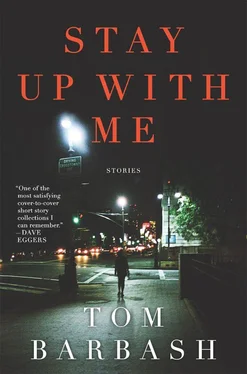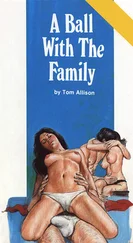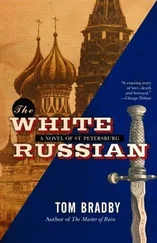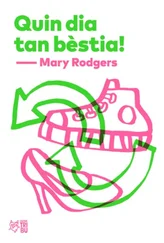“I think a story about that meeting could go front page,” his editor told him. “Especially if you’ve got some people hollering, demanding things from the town board.”
His bureaumate, Marsden, pored through it, his feet on his desk.
“What do you think?” Kistler asked.
“I don’t know, Kistler,” he said. “You’ve got people talking about incest and arson here. They all sound like drunks.”
“That’s a fairly narrow read of it.”
“I guess I’m narrow then.”
On the day of the meeting, Kistler didn’t shave. He put on a creased shirt with thin ridges of dirt on the collar and cuffs and old blue jeans. He took his own camera. It was an afternoon for pinks and blues in the sky and as he drove through the dead tan benchland, disked with corn skeletons and bare thin trees, he realized how focused he’d been the last week or so. It made him feel good.
The day had warmed and the cleared wet road caught the sun. If the meeting went more than three hours, Kistler would have to file by phone, which he didn’t like to do. He’d done it at a drowning and people had eavesdropped on his description of the body he’d seen pulled from the water. It made him feel self-conscious and he edited himself more than he should have. The piece when it ran was flat and had none of the color of the moment.
The meeting was in the town’s fire hall, a florid metal and wood structure that might once have been an airplane hangar. Next to a flagpole on the front lawn, a wide yellow sign listed Bingo nights. Kistler veered around the lot, which was clogged with pickups and cars, a dozen or so children’s bikes with banana seats and thick-ridged tires. It was the biggest meeting Kistler had ever covered.
The air inside was stale, with thick curls of smoke passing through the beams of light, which emerged from two old-style spotlights in the back corners of the room. A podium stood at the center on what looked to be a theatrical stage. A man whom Kistler hadn’t met in his previous visits walked over to greet him. He had a red-and-white-checkered shirt and new blue jeans, eyebrows that came together in a V, and tall black hair that gleamed with comb marks. His name was Mr. Thomas, he said, and he would introduce Kistler.
“People are kind of upset,” he said. “But you can understand that.”
Kistler nodded, though he did not know what he meant.
“I think people will appreciate the guts it took to come out here like this. By yourself, too.” Mr. Thomas had a copy of the story in his hand and Kistler wanted to grab it from him. It felt like he’d stepped onto the wrong train and was heading far from his desired destination. When he looked out at the audience, he saw that nearly every one of them had a copy of the newspaper in their hands.
Mr. Thomas moved to the podium and motioned Kistler to wait to the side, near the American flag.
He poked the microphone until it sang like tires burning. Kistler saw the men from the diner in the front seats. They stared straight at him as if they could make him disappear with a good glare. In fact, it was all men in the first two rows, large and, from the looks of it, angry men in flannel shirts and baseball caps, and behind them were some couples and whole six-member families, children in bright sweatshirts fidgeting. He heard a baby cry and then somebody cough. And then it seemed as if everyone was coughing. He saw other people he’d interviewed.
These people hate me, Kistler thought. Everyone in this room hates my guts.
Mr. Thomas tested the microphone and then smiled unpleasantly.
“We’ve got the reporter here and he’s going to answer our questions,” he said. “I think we’re quite fortunate he made the trip. It’s not everyone who’d do it under the circumstances.”
Mr. Thomas motioned with his hands and then stepped to the opposite side, near an exit. As Kistler walked up, the crowd talked among itself — a sort of angry buzz. The spotlights shone in his face and Kistler felt his flesh leap. His left eye twitched slightly and he took his glasses off to rub his lids.
He pitched forward, feeling almost dizzy, and before he could speak a woman toward the back stood waving the article.
“My children were teased so hard in school they called me up crying,” she said. “We are not a town of lowlifes and building burners.”
The crowd whooped and hollered. Someone called Kistler a son of a bitch. A young voice demanded that he recant. Kistler started to reply and the man yelled, “Just do it, you little prick!” and rushed from his seat. Someone pulled the man down and held him.
Kistler let his pulse settle and composed himself, breathing deeply, and the crowd quieted. He spoke in a calm, flowing voice that felt apart from him. He talked about purpose, about why he went into journalism, his sense of the world’s inequities, his role in their ultimate reversal. He told them how little he was paid, how a lot of jobs would have put him in cushier circumstances. He talked of roaches and mice in his apartment, and the long hours he had to put in. He said he apologized if he upset anyone but his job was to get to the truth.
The old man from the diner stood in the front row, clearly drunk. He staggered and then his voice came out slurred and high pitched. He steadied himself and then began again.
“ ‘No Springtime in Paris ’ ? Do you think we’re funny ?”
Kistler said he hadn’t written the headline. He said parts of the article had been changed. As he spoke, the man with the red face stood, then two others. He saw Helen and a huge man, who must have been her husband, standing near the door.
Mr. Thomas walked over to the microphone. “All right,” he called out. “You’ve made your point. We’re trying to say something about the community here and you all are acting just like it says in his article.”
Kistler wanted none of Mr. Thomas’s defense, which he thought was an unfair read of his work. As Mr. Thomas stepped aside, Kistler whispered to him that he’d come expecting a board meeting.
He spoke into the microphone again. “I wrote what I wrote because it’s what I saw,” he said. The lights felt stronger now and Kistler had trouble focusing. A photographer was taking his picture. From where? he wondered. Who knew about this?
“I’ve always written what I saw,” he said. “I know no other way. I am your voice, don’t you see that? I-am-your-voice. If you’re angry at me, you’re angry at yourself. Your own life.” The crowd was silent now, and Kistler felt empowered, like an evangelist. “You can wallow in this. Attack me like you’re doing or you can strike out and make good lives for yourselves. Strong, caring, important lives of purpose. No one is given anything in this life. Life doesn’t just come to you whether you’re rich or poor, black, white, whatever. You find it. You grasp it. You make something of it.”
About ten people clapped. The rest remained silent.
“That’s all I have to say,” Kistler said.
He walked out the side door. Mr. Thomas stopped and thanked him under the pale blue light of the parking lot. Kistler felt he’d dodged something huge and uncontrollable. Sweat ran cold on his face, and he felt flushed.
He sloshed through the mud and snow of the lot toward his car, which was beyond the glow of the lights, passing two teenagers and a woman in a long coat who wanted to ask him something. He pretended not to notice them. As he walked behind the firehouse, he realized he’d left his jacket and car keys behind at the podium. He saw Mr. Thomas pull away in his blue Mustang and others follow and he felt a deep sickness like nausea hang in his stomach.
He thought of abandoning his car for an hour or two and trying to find a place to hide out in. Every place was closed and he was very cold. He had the feeling he had lost something that he could not yet identify, but that he would know later, the way people do when it’s too late and their decisions have led them where they would never have wanted to be.
Читать дальше












